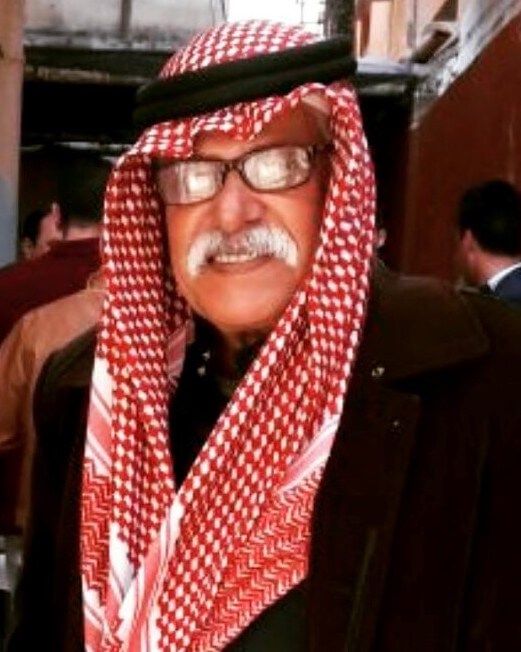It is nearly 2 a.m. in Gaza. It’s a quiet night. No drones. No bombs. Then shrieks. And yet more shrieks.
This has been the case with my cousin, five-year-old Mansour, who regularly wakes sweaty after wetting the bed. Mansour has a recurring nightmare of his grandfather, also Mansour, 69, who was killed in an Israeli airstrike last May.
I remember my uncle shouting at my cousins and me asking if anyone had annoyed little Mansour. My uncle had 14 grandchildren, but I bet that little Mansour was his favorite child, maybe because he had his name.
The day before Eid Al-Adha, my uncle Mansour grabbed his cane and walked to nearby stores to buy some tomato and salty fish, called feseekh, in preparation for spending the Muslim holiday with his family.
During his short walk, two Israeli missiles struck a car next to him in the street. My uncle didn’t expect to be targeted. As always, Israel claims that it defends itself, and it accurately identifies its target bank.

My uncle and four other civilians, all of whom were my neighbors, were killed in the blasts. We weren’t just shocked and saddened by this massacre, but we also felt as if we lost parts of ourselves. Old Mansour, the mukhtar, or head of my family, is no more here.
Everyone in my family noticed the changes in the family childrens’ behaviors after the killing of my uncle Mansour. They show symptoms of post-traumatic stress disorder, increasing signs of distress like bed-wetting, nightmares, and panic from loud sounds, little Mansour included.
A July report from the Euro-Mediterranean Human Rights Monitor found “241 children lost one or both parents as a result of the bombing, about 5,400 children lost their homes (completely destroyed or severely damaged), and 42,000 children had their homes partially damaged.”
Sociologist Mark Ayyash, who has studied violence, social and political theory, wrote at the time of the escalation between Israel and Gaza, “From the very first years of childhood, Palestinians in Gaza receive a clear message from Israel and indeed from the world: you are not human, and we do not care.”
“Some children in this world get to gaze at the stars, kickstarting their sense of wonderment and discovery,” Ayyash said. “The children in Gaza are forced instead to gaze at stones, at the rubble. “

Little Mansour’s mother tells me that he refuses to go to his kindergarten, saying, “Where is my grandfather? I need my grandfather.” As my uncle used to deliver him to his nursery school every day, little Mansour refused to go to the kindergarten after the Israeli airstrike killed old Mansour.
As I have a degree in English, I used to gather neighborhood children on Fridays and read English stories to them. I enjoy teaching and entertaining them. My uncle’s house is next to ours. So, little Mansour was always the first on the scene, but after his grandfather was killed, he just came twice. The five-year-old boy who was full of innocence and life has become an introvert.
Little Mansour’s mother, Dova, told me recently that her son asked: “to come down to the grave of his grandfather to give him a kiss, when his father and I took him and his sister Sham, 4, to the cemetery.”
“I couldn’t answer, but I cried when Sham asked me, ‘Is my grandfather going to wake up and go home with us, mama?’” she added.
Each of Gaza’s children has many questions that must be answered. Like Talia, 3, my niece, questions, “Why does Israel want to kill me with an airstrike? Does Israel kill other children across the world the same way it kills us?’
My uncle Mansour was one of the many victims who was killed in cold blood. War is never over. In Gaza, there is no post-trauma, we’re all still mid-trauma, and the little ones pay the largest price.
Children under 15 make up about half of the two million people living in Gaza. During the 11-day escalation in May, 256 were Palestinians were killed including 66 children, and another 540 children were injured, according to the Palestinian Ministry of Health.
Since September 2000 to 1,727 Palestinian minors in the Gaza Strip have been killed by Israeli forces, according to the Israeli human rights group B’Tselem.
Ahmed Dremly
Ahmed Dremly is a creative writer and translator from the Gaza Strip. Follow him on Twitter at @ahmedhodremly.
Mondoweiss is a nonprofit news website dedicated to covering the full picture of the struggle for justice in Palestine. Funded almost entirely by our readers, our truth-telling journalism is an essential counterweight to the propaganda that passes for news in mainstream and legacy media.
Our news and analysis is available to everyone – which is why we need your support. Please contribute so that we can continue to raise the voices of those who advocate for the rights of Palestinians to live in dignity and peace.
Support Mondoweiss from as little as $1. Thank you.
Related posts:
Views: 0
 RSS Feed
RSS Feed

















 October 20th, 2021
October 20th, 2021  Awake Goy
Awake Goy 
 Posted in
Posted in  Tags:
Tags: 
















